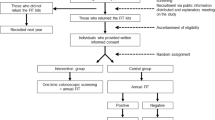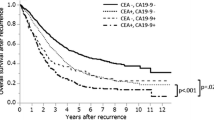Abstract
Background and Aim
Despite the limitations of screening or early diagnosis of colorectal cancers (CRC), carcinoembryonic antigen (CEA) is frequently measured in practice and during health promotion programs. The aim of this study was to evaluate the role of colonoscopy in healthy individuals with elevated CEA levels.
Methods
From January 2003 to November 2008, 117,731 healthy persons underwent an opportunistic screening program in two health promotion centers; 1,497 subjects (1.3%) showed an elevated CEA level (>5 ng/ml). Among them, 174 patients were recruited to undergo a colonoscopy to determine if colorectal malignancies were present. A total of 372 age- and sex-matched persons were selected as controls from among the healthy subjects who had a normal level of CEA and had received surveillance colonoscopy. The primary outcome was the incidences of CRC in elevated CEA and normal CEA groups. The secondary outcome was the predictive factors of CRC in the elevated CEA group.
Results
The incidence of CRC was higher in the group with higher CEA-levels than in the group with normal CEA levels (4.6 vs. 1.3%; P = 0.031). In the CEA-elevated group, patients with CRCs were diagnosed at more advanced stages than were those in the CEA-normal group. The incidence of colorectal polyps was not different between the two groups. In the CEA-elevated group, anemia was an independent predictive factor of CRCs by multivariate analysis (P = 0.002).
Conclusion
Anemia itself is not a predictive factor of CRC in the entire population, but is an independent predictive factor of CRC in healthy individuals with an elevated level of CEA. Therefore, colonoscopy should be recommended for healthy subjects with an elevated level of CEA accompanied with anemia in the absence of other adenocarcinomas to evaluate the presence of colorectal malignancy.


Similar content being viewed by others
References
Boulware LE, Marinopoulos S, Phillips KA, et al. Systematic review: the value of the periodic health evaluation. Ann Intern Med. 2007;146:289–300.
Han PK. Historical changes in the objectives of the periodic health examination. Ann Intern Med. 1997;127:910–917.
Fenton JJ, Cai Y, Weiss NS, et al. Delivery of cancer screening: how important is the preventive health examination? Arch Intern Med. 2007;167:580–585.
Lee TW, Lee CY, Kim HS, et al. Health promotion health center project. Public Health Nurs. 2007;24:529–537.
Kim HR, Lee CH, Kim YW, et al. Increased CA 19–9 level in patients without malignant disease. Clin Chem Lab Med. 2009;47:750–754.
Kim JE, Lee KT, Lee JK, et al. Clinical usefulness of carbohydrate antigen 19–9 as a screening test for pancreatic cancer in an asymptomatic population. J Gastroenterol Hepatol. 2004;19:182–186.
Lim YK, Kam MH, Eu KW. Carcinoembryonic antigen screening: how far should we go? Singapore Med J. 2009;50:862–865.
Sturgeon C. Practice guidelines for tumor marker use in the clinic. Clin Chem. 2002;48:1151–1159.
Bast RC Jr, Ravdin P, Hayes DF, et al. 2000 update of recommendations for the use of tumor markers in breast and colorectal cancer: clinical practice guidelines of the American Society of Clinical Oncology. J Clin Oncol. 2001;19:1865–1878.
Duffy MJ. Carcinoembryonic antigen as a marker for colorectal cancer: is it clinically useful? Clin Chem. 2001;47:624–630.
Burt RW. Colon cancer screening. Gastroenterology. 2000;119:837–853.
Rubio CA, Nesi G, Messerini L, et al. The Vienna classification applied to colorectal adenomas. J Gastroenterol Hepatol. 2006;21:1697–1703.
Schlemper RJ, Riddell RH, Kato Y, et al. The Vienna classification of gastrointestinal epithelial neoplasia. Gut. 2000;47:251–255.
Winawer SJ, Zauber AG, O’Brien MJ, et al. Randomized comparison of surveillance intervals after colonoscopic removal of newly diagnosed adenomatous polyps. The National Polyp Study Workgroup. N Engl J Med. 1993;328:901–906.
Compton C, Fenoglio-Preiser CM, Pettigrew N, et al. American Joint Committee on Cancer Prognostic Factors Consensus Conference: Colorectal Working Group. Cancer. 2000;88:1739–1757.
Wei EK, Giovannucci E, Wu K, et al. Comparison of risk factors for colon and rectal cancer. Int J Cancer. 2004;108:433–442.
Imperiale TF, Glowinski EA, Juliar BE, et al. Variation in polyp detection rates at screening colonoscopy. Gastrointest Endosc. 2009;69:1288–1295.
Gold P, Freedman SO. Demonstration of tumor-specific antigens in human colonic carcinomata by immunological tolerance and absorption techniques. J Exp Med. 1965;121:439–462.
Chevinsky AH. CEA in tumors of other than colorectal origin. Semin Surg Oncol. 1991;7:162–166.
Stevens DP, Mackay IR, Cullen KJ. Carcinoembryonic antigen in an unselected elderly population: a four year follow up. Br J Cancer. 1975;32:147–151.
Cullen KJ, Stevens DP, Frost MA, et al. Carcinoembryonic antigen (CEA), smoking, and cancer in a longitudinal population study. Aust N Z J Med. 1976;6:279–283.
Goldstein MJ, Mitchell EP. Carcinoembryonic antigen in the staging and follow-up of patients with colorectal cancer. Cancer Invest. 2005;23:338–351.
Eom BW, Lee HJ, Yoo MW, et al. Synchronous and metachronous cancers in patients with gastric cancer. J Surg Oncol. 2008;98:106–110.
Lim SB, Jeong SY, Choi HS, et al. Synchronous gastric cancer in primary sporadic colorectal cancer patients in Korea. Int J Colorectal Dis. 2008;23:61–65.
Tomoda H, Taketomi A, Baba H, et al. Multiple primary colorectal and gastric carcinoma in Japan. Oncol Rep. 1998;5:147–149.
Begent RH. The value of carcinoembryonic antigen measurement in clinical practice. Ann Clin Biochem. 1984;21:231–238.
Thomas P, Toth CA, Saini KS, et al. The structure, metabolism and function of the carcinoembryonic antigen gene family. Biochim Biophys Acta. 1990;1032:177–189.
Doos WG, Wolff WI, Shinya H, et al. CEA levels in patients with colorectal polyps. Cancer. 1975;36:1996–2003.
Fischbach W, Mossner J. Do size, histology, or cytology of colorectal adenomas and their removal influence serum CEA? Dis Colon Rectum. 1987;30:595–599.
Slattery ML, Boucher KM, Caan BJ, et al. Eating patterns and risk of colon cancer. Am J Epidemiol. 1998;148:4–16.
Center MM, Jemal A, Ward E. International trends in colorectal cancer incidence rates. Cancer Epidemiol Biomarkers Prev. 2009;18:1688–1694.
Acknowledgments
The authors thank Soung Min Jeon, Chang Mo Moon and Jae Jun Park for their assistence throughout this study.
Conflict of interests
The authors have no commercial associations that might represent a conflict of interest in relation to this manuscript.
Ethics approval
This study was approved by the Human Research Review Committees of Severance Hospital, Yonsei University and Sanggye Paik Hospital, Inje University, Korea.
Author information
Authors and Affiliations
Corresponding author
Rights and permissions
About this article
Cite this article
Lee, J.H., Hong, S.P., Jeon, T.J. et al. Should a Colonoscopy be Recommended for Healthy Individuals with Increased Carcinoembryonic Antigen Levels? A Case–Control Study. Dig Dis Sci 56, 2396–2403 (2011). https://doi.org/10.1007/s10620-011-1606-1
Received:
Accepted:
Published:
Issue Date:
DOI: https://doi.org/10.1007/s10620-011-1606-1




